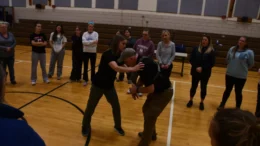The Associated Press
SAN JOSE, Calif. — The Penguins knew going into the Stanley Cup final that San Jose was the bigger team.
 That its players are, on average, one inch taller and 10 pounds heavier than the Penguins.
That its players are, on average, one inch taller and 10 pounds heavier than the Penguins.
They also figured the Sharks would try to exploit that edge in size by hitting them as hard and as often as possible.
And as the series — which resumes with Game 4 tonight at SAP Center — has progressed, that has been an integral part of San Jose’s game plan.
Both teams were credited with 36 hits in the Penguins’ 3-2 victory in the series opener. Since then, the Sharks have run up a 90-53 advantage, including a 47-17 edge in their 3-2 overtime victory in Game 3 Saturday.
But if the idea is to pound the Penguins into submission, it hasn’t worked.
Not yet, at least.
No better than it did when the New York Rangers tried it in the opening round. Or when Washington did likewise in the Eastern semifinals. Both clubs tried to impose their will on the Penguins by playing the body.
Both are deep into their offseason now, and the Penguins are two victories away from a championship.
“Teams have been trying to outmuscle us, trying to intimidate us, for the last three months,” defenseman Ben Lovejoy said after the Penguins’ practice Sunday at SAP Center.
“The Rangers did it. Washington did it. … We’re a team that prides ourselves on being brave.
“On going back for pucks. On winning pucks against bigger players. On taking hits. And we need to continue that.”
San Jose leads these playoffs with 714 hits. Although the Penguins aren’t shy about initiating contact — their 629 hits place third in the league — they are used to opponents trying to knock them off their game.
Literally.
“From day one of the playoffs, we knew every team was going to try to play physical against us,” left winger Carl Hagelin said. “When we skate the way we can and finish our checks, we’re not fun to play against.”
An occasional power-play goal might help to dissuade the Sharks from playing such a rigorous and vigorous style — penalties are the inevitable byproduct of constantly playing the body, because even the most well-intended check will be high or late every now and then — but the Penguins are 0 for 6 with the extra man in this series.
They haven’t had many opportunities with the man-advantage, and have done little with the ones they’ve gotten.
“There haven’t been a ton of power plays,” coach Mike Sulllivan said after his team managed just one shot on goal during its lone try with the extra man in Game 3. “It’s not easy to get into any sort of rhythm.”
That has been reflected in just about every aspect of their power play. The Penguins are struggling to get into the San Jose end, and usually aren’t very threatening once they get there.
“I don’t think our entries [to the offensive zone] have been as clean in this series as we’ve been [in previous ones],” Sullivan said. “In the prior series, our entries have been really successful, [with a] high percentage of entry possessions. I don’t think they’ve been quite as clean.”
He pointed that a half-dozen power plays is a small sample size — “We’ve had a few near-misses. So if we score on one of them, when you only have a few, your [conversion] percentage changes pretty quickly” — and insisted that there are no fundamental flaws to correct.
“I don’t think it’s anything that we need to overthink,” Sullivan said. “I just think we’ve got to execute a little bit better.”




































